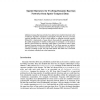Free Online Productivity Tools
i2Speak
i2Symbol
i2OCR
iTex2Img
iWeb2Print
iWeb2Shot
i2Type
iPdf2Split
iPdf2Merge
i2Bopomofo
i2Arabic
i2Style
i2Image
i2PDF
iLatex2Rtf
Sci2ools
115
Voted
GECCO
2003
Springer
2003
Springer
Spatial Operators for Evolving Dynamic Bayesian Networks from Spatio-temporal Data
Learning Bayesian networks from data has been studied extensively in the evolutionary algorithm communities [Larranaga96, Wong99]. We have previously explored extending some of these search methods to temporal Bayesian networks [Tucker01]. A characteristic of many datasets from medical to geographical data is the spatial arrangement of variables. In this paper we investigate a set of operators that have been designed to exploit the spatial nature of such data in order to learn dynamic Bayesian networks more efficiently. We test these operators on synthetic data generated from a Gaussian network where the architecture is based upon a Cartesian coordinate system, and real-world medical data taken from visual field tests of patients suffering from ocular hypertension.
Related Content
| Added | 06 Jul 2010 |
| Updated | 06 Jul 2010 |
| Type | Conference |
| Year | 2003 |
| Where | GECCO |
| Authors | Allan Tucker, Xiaohui Liu, David Garway-Heath |
Comments (0)

